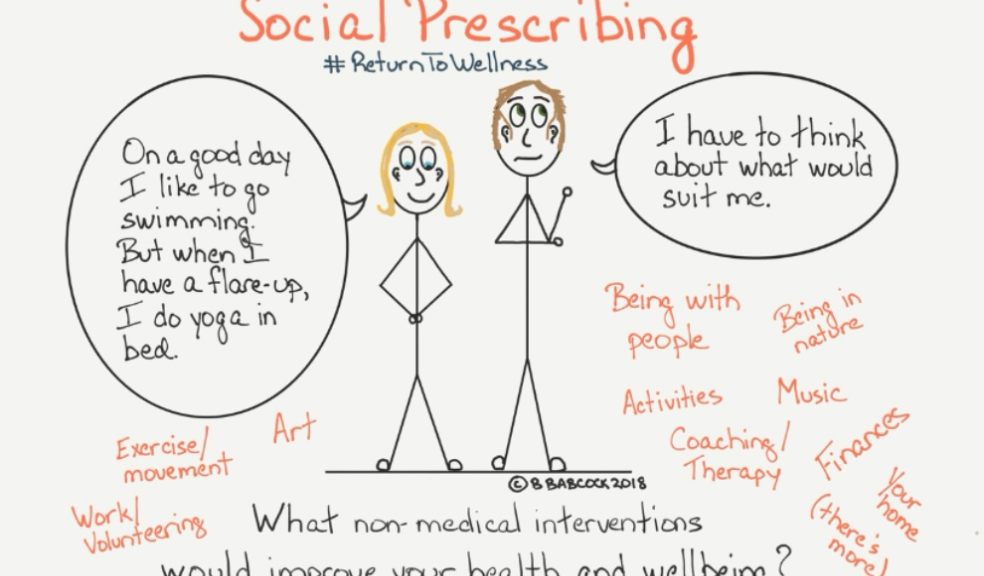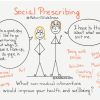
Have you heard of Social Prescribing?
I ask this as recently we had a conversation during a dementia training session about local community resources and I brought the term into conversation.
There were several attendees working in the health and social care sector who had not heard of this important community role leading me to write this brief overview.
At its simplest a Social prescriber (SP) centres around connecting people with activities and services that improve their health and well-being. Before I go on allow me to share the interchangeable terms you may hear to avoid confusion which in essence mean the same. You may hear ; link workers, community connectors, navigators, wellbeing advisors or coaches etc.
Social prescribing is an all-age, whole population approach that works well for people who:
- have one or more long term conditions
- need support with low level mental health issues
- are lonely or isolated
- have complex social needs which affect their wellbeing.
Many GP practices (you may also hear - Primary Care Networks (PCN) a small group of managed practices) often have a Social prescriber in house whereby their GP can refer them, in addition to charities, local agencies and health and social care services. You may also make a self referral.
Social prescribing and similar approaches have been practised in the NHS for many years dating back to the 1990s and even earlier. For a long time though social prescribing practised in pockets and largely unnoticed by national NHS bodies.
Why do we need Social Prescribers ?
“It is estimated that almost a fifth of GP appointment time is spent on non-medical problems - including loneliness, isolation, relationship issues, or stress related to money or housing. Social prescribing gives doctors, organisations, and other professionals a way to help people, and address their problems more effectively (Evidence shows that social prescribing can take pressure off the NHS by reducing the need for GP appointments and for medical prescriptions” (National Academy of Social Prescribing)
There are many situations where medicine cannot be treated by Doctors or medicine alone and social prescribing can work alongside or instead of it. However our automatic default is to make a GP appointment.
Society is ever changing and seemingly becoming more and more complex, therefore we are being encouraged to ask ourselves ‘What matters to us?’ without this reflection time how do we really know what is important; what makes our heart sing; what moves us; what makes us cry; what brings us joy; how do we enjoy spending our time. A few questions to consider offering a lens to our social wellbeing. In my mind these questions are vital. With regular reflection we learn what’s important in our lives.
What are the benefits ?
it can help change the circumstances that make people unwell
empower people to manage their health problems
prevent isolation and depression and create a sense of self and belonging
Example case study
3 months ago I met with Maggie, a family dementia carer who was struggling to support her partner Bella. Bella was becoming more and more agitated and bored as her original hobbies and interests were more of a challenge for her living with one of the rare dementias - Posterior Cortical Atrophy (PCA). What I did know is she loved to sing but I was unaware Maggie did too which I discovered after a conversation. Whilst I am not a SP generally I was very aware of three local singing groups which had accessible support for families with dementia. After visiting all three groups Maggie & Bella settled on the one which was nearest to their home. They have attended 4 sessions together and on my recent visit were animated in their explanation of the impact it has begun to have on them with the added bonus of forming new relationships and a welcome cup of tea and homemade cake.
This may seem a very simple example and result but the impact must not be underestimated.
Social Prescribers can help support agency opening up opportunities by illuminating what is available to a person based on their interests and individual needs. Enabling them to be aware of local resources to make informed decisions in how they may gain support in the community and enhance their wellbeing.
As National Carer’s week draws to a close I urge you to seek out what’s available in your local community which may create a mutually fulfilling experience for yourself and your loved one. Or indeed there may also be opportunities whereby your independent needs can be met enabling you to regain your sense of self which many carers explain they feel they begin to lose over time.
Further reading
To learn about the model of social prescribing visit the National Academy for Social Prescribing - https://socialprescribingacademy.org.uk/.
You can find out more about social prescribing and the social prescribing link worker role in these frequently asked questions.
Gina Awad is the Founder and lead of the Exeter Dementia Action Alliance, supports families living with dementia as an advocate and companion and is the author of ‘United Caring For Our Loved Ones Living With Dementia’ illustrated by the late great Tony Husband.

















